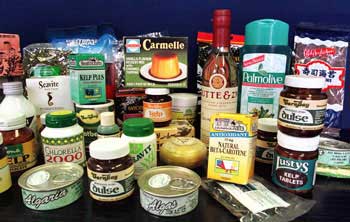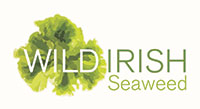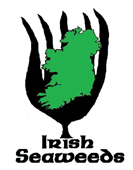Food additives from seaweeds
 Food additives made from seaweeds are mainly polysaccharides, long-chained molecules that are extracted from brown and red algae. These fall into three families: agars and carrageenans from red algae, and alginates from brown algae.
Food additives made from seaweeds are mainly polysaccharides, long-chained molecules that are extracted from brown and red algae. These fall into three families: agars and carrageenans from red algae, and alginates from brown algae.
Their usefulness lies mainly in their ability to emulsify, stabilise and thicken, but that they come from a natural source is, these days, a major advantage. Humans do not seem to have the ability to break them down, so they can be very useful in low-fat foods. Some coralline algae are now used as natural sources of calcium and magnesium sulphate.
Alginate beads, dyed with natural colours (below) and with added fish oils, have been used as fish-egg substitutes.

.jpg)




